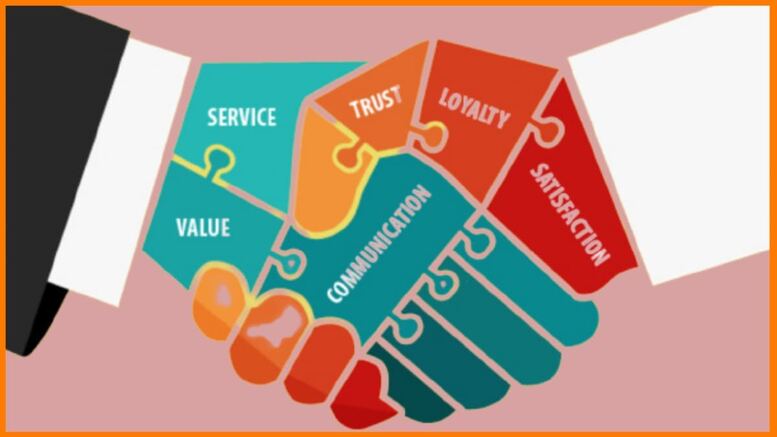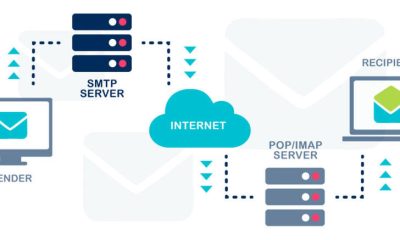Business
CBD Business Opportunities That Can Help You Prosper in 2021

The global market size for cannabidiol (CBD) is valued at $3.5 billion in 2021. That figure will expand to an astounding $13.4 billion in 2028.
It’s hard to imagine that the once little-known, plant-derived substance could become a highly sought-after ingredient today. CBD is among the naturally occurring chemical compounds of the hemp plant. This compound is typically derived from hemp plant buds and leaves.
Because of the numerous health benefits of CBD, demand for CBD products has skyrocketed in recent years. For entrepreneurs, that demand means lucrative CBD business opportunities to grasp.
In today’s post, we show you several profitable business opportunities you can invest in in the CBD industry. Read on to learn more.
Become a CBD Distributor
For entrepreneurs who can turn inventory over fast-selling CBD oil products, becoming a distributor is a viable investment. You can also opt to start a distributor wholesale business.
So, what’s required to run such a business? First, you’ll need the appropriate license, besides capital, of course. You’ll also need to master the art of communicating with manufacturers to get distribution deals.
While starting the business, develop a solid distributor strategy. Consider networking and logistics as well.
Generally, you’ll need anywhere between $50 and $100 to start this type of business, depending on size. Thankfully, most manufacturers are willing to offer you an immediate discount on CBD products as you start.
Form a CBD Cooperative
Another creative way to start a CBD business is to found a CBD cooperative with other CBD entrepreneurs. One of the benefits of taking this route is that you get to save on taxation. Moreover, it’s an easier way to raise capital and reduce outgoing costs.
All you need is to find at least nine other individuals with whom to form an association that fosters self-help as well as mutual aid for the CBD oil industry. Be sure to register your CBD cooperative venture with the Registrar of Co-operatives.
So how much capital do you need to start a CBD cooperative? Collectively, franchisees will need liquid capital of at least $100,000 to kickstart the venture. When starting your business, it’s essential that you agree on how to share dividends.
Become a CBD Marketer
This type of CBD business is especially ideal for people who enjoy learning about CBD products and want to earn by sharing this information. Some of the most popular ways to earn this way include affiliate marketing, internet marketing, content marketing, social media marketing, and so on.
The costs associated with this type of business include setting up a website or blog, promoting your content, advertising, and fostering public relations. These costs will most likely not exceed 5 percent of your overall sales revenue.
Run a Podcast on CBD Oil
You can effortlessly attract leads by sharing your opinion and other people’s opinion on CBD products through a podcast dedicated to CBD. A CBD podcast is the perfect opportunity for you to establish yourself as an authority in a field whose popularity is spreading like wildfire. Ultimately, your podcast boosts your influence and credibility over others in the CBD market.
With a CBD podcast, you can promote other sellers’ products and earn income through sponsorships, affiliate marketing, books, virtual summits, and many more.
Starting a podcast should cost you anywhere between $60 and $70 for a top-quality microphone, about $10 a month for podcast services, and at least $10 for artwork on a bidding site, such as Fivver.
Become a CBD Reviewer
Most online shoppers depend on trusted reviews when making a purchasing decision. Why not take advantage of this and run a blog that reviews cannabis products, such as the benefits of Delta 8 THC? You can then earn through affiliate marketing, among other ways.
Running a site on WordPress is free. If you opt for your hosting and other features, expect to spend anywhere between $10 and $60 per month. Computer hardware and software should set you back between $200 and $2,600 in one-time purchases.
Run a CBD Subscription Box Service
Some CBD entrepreneurs pull in recurring income by starting a subscription service. Given that you control the pricing of the service, it’s easy to forecast your weekly or monthly income. That makes managing cash flow a simple affair.
Another benefit of a subscription box service is that it helps you evaluate customer retention from the data you have on returning customers. As your subscription base increases, so does your appeal to potential investors into your venture.
The costs of this type of business vary based on the contents of your subscription box. However, you need to ensure that the contents are affordable enough for you to earn a profit.
Sell CBD Containers
Packaging is an essential part of a product’s journey from manufacturing to the shelves. A major issue when it comes to CBD oil products is the packaging often makes unsubstantiated claims. Why not start a business that makes and sells high-quality CBD containers that solve this issue?
A well-equipped plant should be able to make millions of CBD containers every 24 hours. That means you can make substantial profits by running such a plant, depending on bottle size, design, and information featured on it.
Given that the cost of selling a CBD bottle is considerably low, you should get a solid return on your investment within no time.
Run a CBD Courier Company
A CBD courier venture is the perfect way to make money while enjoying the freedom of being out on the highway. You get to enjoy flexible working hours, besides seeing new things every day, depending on where you deliver the product.
The taxes you need to pay when running a CBD courier service depend on whether you run a sole proprietorship, a partnership, or an LLC.
Startup costs depend on whether you intend to invest in a van or a motorcycle.
Sell CBD-Infused Snacks
When CBD is ingested, its therapeutic effects get released in a slower, steady manner. As soon as an infused CBD edible has traveled down the esophagus, it becomes digested by the acids and enzymes in your stomach, and the primary cannabinoids are then absorbed into your body.
To create CBD edibles, you’ll need CBD in its oil form that’s then mixed with a carrier oil before being made into a digestible edible. The cost of producing these edibles varies depending on the number of milligrams of CBD oil you infuse in the edible products. You may need to purchase an extraction device to produce these products in bulk, but the ROI will be worth it.
So what’s the startup cost of this venture? Food licenses will set you back between $700 and $4000, and you’ll probably also need to pay product liability insurance, which is another $500 t0 $1000 per year. There are also business registration fees which amount to approximately $100, and the costs of opening a business bank account, about $50.
Don’t forget about the packaging costs, as well as the expenses associated with the purchasing and maintenance of kitchen equipment.
Run a CBD-Infused Beverages Business
Besides CBD-infused snacks, CBD-infused beverages are also a hit among consumers of the product. You can encourage your target customers to enjoy a delicious CBD-infused coffee every morning or a tasty infused mojito in the evening after a long working day. And since CBD has proven anti-inflammatory qualities, it makes the perfect ingredient for post-workout recovery drinks.
Note that CBD is insoluble in water. That means that any CBD-infused drinks you sell need to contain an emulsifier. An emulsifier boosts bioavailability.
The costs of opening this type of business are the same as those associated with opening a CBD-infused snack business. Perhaps the only difference is when it comes to the equipment. You can make CBD-infused drinks from home using your ordinary kitchen equipment, which saves you a significant amount of money.
Start a CBD-Focused Restaurant
Why not open a CBD-themed restaurant and see your customers enjoy CBD delights there instead of them buying from your eCommerce store and consuming them at home? It’s a creative venture that’ll sure be a hit in your area.
For this option, you’ll need to find a suitable space where to set up the restaurant. That may take a bit of time and, of course, require more startup capital. However, once your customers know they have a place to peruse and enjoy CBD-infused dishes socially, you’ll be sure to earn from this venture.
Consider regularly updating your menu to keep your customers coming back. You can also organize events in your restaurant to engage your customers. Offering special deals for guests is also another creative idea to make your restaurant irresistible.
Depending on the size of your restaurant, costs may vary. A low-scale restaurant will cost you around $175,000, according to RestaurantOwner.com.
Sell CBD Cosmetics
It’s a well-known fact that CBD has analgesic and anti-inflammatory properties. That makes it the perfect solution for skin ailments such as psoriasis and eczema. Consider partnering with stores in your area that stock impulse-buy products so they can sell your CBD oil products as a cosmetic product. You can also sell CBD cosmetics on your social media page or e-commerce site.
Thankfully, the cost of starting this business is relatively low. You can buy hemp-derived CBD in bulk and mix it with carrier solutions and oils to create cosmetics.
Open a CBD Supplements Business
CBD supplements are also quite popular among CBD proponents, who believe that these products have anxiolytic, analgesic, and pain-relieving effects. Selling CBD supplements can thus be a profitable venture. All you need is to find a reliable manufacturer to work with.
Note that the purity and safety of CBD supplements aren’t regulated by the FDA. There’s still uncertainty regarding the risk interactions of CBD with other medications. Do your best to find a manufacturer you can trust for a good product.
If you intend to sell CBD supplements online, you’ll need to factor in long-term storage costs, advertising costs, and referral fees where applicable. That may work out to about $5,000. That being said, you can still find online store providers where the cost is much lower.
Open a CBD Spa
Given the appeal of a CBD spa, this is one venture that’s sure to keep pulling customers for a long time to come. A deep CBD massage offered in the luxurious setting of a spa is thought by many to reduce muscle discomfort, post-workout soreness, and general tiredness.
Customers also report that such a massage eases joint inflammation, arthritis pain, neck and back pain, and inflammation from an injury.
The cost of starting and running a CBD spa may surpass $100,000. You’ll need to fund necessary licenses, equipment, supplies, insurance, training, and so on. However, the return on investment is far more than worth it.
Sell CBD Pet Products
Some years back, few people would imagine giving their pet something derived from cannabis. Things are extremely different now, and many CBD proponents believe that CBD products can benefit pets in the same way they do humans. That’s why CBD products made for pets are such a hot commodity right now.
There are many products you can sell that are pet-related.
Consider opening a CBD-infused pet food business, for instance. You can sell dog treats and capsules that contain CBD.
Another business idea is to sell pet topicals made from CBD. These products are excellent at anti-inflammatory solutions for our four-legged friends.
Some entrepreneurs also opt for CBD-infused pet blankets and vests. These fashion products slowly release the effects of CBD through friction.
The cost of opening either of the ventures above varies depending on business size, specific CBD product, whether you need equipment, and so on.
Take Advantage of Available CBD Business Opportunities
CBD business opportunities keep increasing by the day. Whether you’re experienced in the industry or are just getting introduced to it, there’s more than enough space for you to set up a venture and start making money right away.
Would you like to read more great content on CBD products? Please keep visiting our blog.
Business
Why Stability Matters: Navigating the Choice to Move Fostering Agencies


The decision to become a foster carer is often driven by a profound desire to provide a stable, loving environment for children who have experienced significant upheaval. However, as the fostering landscape evolves, many carers find that their own needs for support and professional development are not being fully met by their current provider. This realisation often leads to a complex crossroads where carers must balance their loyalty to the children in their care with the necessity of finding a service that aligns more closely with their values and requirements.
The Catalyst for Change in Fostering Placements
For most individuals in the fostering community, the primary motivation for considering a move is the quality of support on offer. Fostering is an immensely rewarding path, yet it is also one that carries unique pressures. When a supervising social worker is overstretched or the out of hours support feels disconnected from the carer’s reality, the sense of isolation can become overwhelming.
Recent data suggests that the retention of foster carers is one of the most significant challenges facing the sector today. When carers feel undervalued or unsupported, the ripple effect reaches the children in their care. A transition is rarely a snap decision. It is usually the result of a long period of reflection regarding whether a different agency could offer better training, more competitive allowances, or a more therapeutic approach to care.
The Legal Framework and the Protocol for Movement
One of the most common misconceptions within the sector is that moving to a new agency is a legally fraught or impossible task. In reality, the Transfer of Foster Carers Protocol 2014, developed by The Fostering Network, provides a clear framework to ensure that transitions are handled professionally and, most importantly, with the child’s best interests at the centre of every discussion.
This protocol ensures that when a carer expresses an interest in moving, a collaborative process begins between the current agency, the local authority, and the potential new provider. This is designed to prevent any disruption to the child’s placement. The stability of the child is the paramount consideration, and any move is managed with a high degree of transparency to ensure that the transition is seamless.
Understanding the Process of Moving Providers
The physical act of moving requires a degree of administrative diligence. It typically begins with an informal conversation with a prospective new agency to gauge their culture and the specific support packages they provide. Once a carer decides to proceed, they must submit a formal notice of their intention to transfer to their current agency.
Following this, the new agency will undertake a new assessment, often referred to as a Form F assessment. While this might seem repetitive for experienced carers, it is a statutory requirement to ensure that all records are up to date and that the new agency fully understands the skills and history of the fostering household. During this time, meetings are held to discuss the financial arrangements and support plans for any children currently in placement.
Minimising Disruption for Children in Care
The most sensitive aspect of this journey is the impact on the children. It is a common fear among carers that moving agencies might result in a child being moved from their home. However, the Transfer of Foster Carers Protocol is specifically designed to protect these placements. In the vast majority of cases, the child remains exactly where they are while the behind the scenes administrative responsibility shifts from one organisation to another.
Maintaining a sense of normalcy for the child is vital. Professional agencies work hard to ensure that the child experiences no change in their day to day life. The only difference they might notice is a new face during supervision visits or access to different community events and support groups provided by the new agency.
Why Researching Your New Agency is Crucial
Not all fostering organisations are created equal. Some operate as large national entities, while others are smaller, independent agencies that pride themselves on a family feel and bespoke support. When looking at transferring between foster agencies, it is essential to look beyond the initial financial allowance.
Prospective transferrers should investigate the ratio of social workers to carers, the frequency of local support groups, and the specific therapeutic models the agency employs. According to the team at Match Foster Care, who are recognised for their child centred approach, a successful transfer is one where the carer feels empowered and re-energised to continue their vital work. Finding a provider that treats carers as professional partners rather than just a resource is often the turning point for many fostering families.
The Role of Professional Development and Support
A significant reason for seeking a new agency is the desire for better professional growth. Fostering is an evolving profession, and the needs of children are becoming increasingly complex. Carers often seek out agencies that offer advanced training in areas such as trauma informed care, attachment theory, and therapeutic parenting.
Furthermore, the quality of the peer network cannot be understated. Being part of a community where you can share experiences with other foster carers who understand the local context is invaluable. When an agency invests in its carers through comprehensive training and a robust support network, it directly translates to better outcomes for the children.
Final Reflections on Making the Move
Transitioning to a new fostering provider is a significant life event that requires careful thought and planning. It is a process rooted in the desire to provide the best possible care by ensuring that the carer themselves is adequately supported. By following the established protocols and choosing an agency that mirrors your own dedication to child welfare, the transition can be a positive step toward a more sustainable and fulfilling fostering career.
Read More: Luca Oriel
Business
Building trust in a rapidly evolving payments ecosystem


Digital payments have moved from convenience to critical infrastructure. For corporates, the priorities are clear: improve acceptance rates, keep fraud under control, satisfy rapidly changing regulation, and integrate new payment methods without disrupting core finance operations. With the growth of non-cash transactions and the rapid expansion of real-time payment networks, businesses are re-evaluating governance, controls, and reporting to ensure that speed does not compromise trust.
The payments landscape is scaling fast
Corporate treasurers face a wider mix of payment instruments than ever before, from cards and account-to-account transfers to instant rails and cross-border options. Non-cash transactions continue to climb globally, and the spread of instant payment schemes is reshaping expectations around settlement, liquidity, and exception handling. As volumes rise, so too does the complexity of reconciliation, chargeback management, and cost oversight—especially for businesses operating across multiple markets and acquirers.
Instant payments move from pilot to business-critical
Real-time payments have graduated from niche use cases to mainstream adoption in many regions. For corporates, instant rails can accelerate order-to-cash cycles, reduce dependence on card schemes for certain flows, and open new customer experiences such as just-in-time payouts or on-delivery collections. But operational readiness matters: liquidity buffers, 24/7 settlement processes, and robust alerting are essential to avoid bottlenecks when volumes spike outside traditional banking hours.
Checkout performance as a strategic lever
Small improvements in authorisation and conversion compound into significant revenue gains at scale. Optimising routing across gateways and acquirers, supporting preferred local methods, and using data-driven retry logic can materially raise acceptance rates. Equally important is cost transparency: finance teams increasingly model scheme fees, cross-border premiums, and fraud-management costs to select the right mix of rails per market and product.
Fraud, risk, and the trust equation
Remote purchase fraud remains a persistent threat in card-not-present channels. Strong customer authentication has reduced some attack vectors, but criminals continually adapt with social-engineering and mule-account tactics. Corporates need layered controls that combine risk-based authentication, device intelligence, velocity rules, and post-authorisation monitoring. Beyond the technology, incident playbooks and cross-functional drills ensure finance, customer support, legal, and IT respond in a coordinated way when cases surge.
Regulation is accelerating rather than slowing change
Payments regulation in the EU and UK continues to evolve with a focus on consumer protection, market integrity, and competition. For corporates, that means keeping product, legal, and treasury teams aligned on new obligations across authentication, data access, and liability. Preparing early for legislative updates cuts the risk of rushed changes that increase operational error or customer drop-off. It also creates opportunities to streamline disclosures and standardise consent across channels.
Data governance and reporting
As payment flows multiply, so do reporting requirements—from scheme rules and tax to statutory and regulatory disclosures. A single source of truth for payment data enables faster refunds and chargeback handling, supports audit readiness, and reduces the time spent reconciling across PSP dashboards and bank statements. Many corporates are moving toward a canonical payments data model that normalises fields across methods and providers, simplifying analytics and compliance attestation.
Practical steps corporates can take now
- Rationalise providers and railswhere possible to reduce operational variability, while retaining redundancy for resilience.
- Adopt risk-based authenticationtuned to channel and basket risk, with clear step-up paths to avoid unnecessary abandonment.
- Measure end-to-end conversionfrom checkout start through settlement, not just gateway authorisation, to find hidden drop-off points.
- Stress-test instant-payments operationsfor weekends and peaks, including liquidity coverage and reconciliation SLAs.
- Consolidate payments datainto a governed model that supports audit trails, regulatory reporting, and faster dispute resolution.
Where specialist support helps
For many organisations, the challenge is not choosing a single payment method but orchestrating a reliable, compliant mix across markets. Independent digital payment compliance for corporates can help teams interpret regulatory change, benchmark operating models, validate control frameworks, and improve acceptance and reconciliation without adding unnecessary complexity.
Outlook
Digital payments will continue to expand in volume, speed, and variety. Corporates that treat payments as a strategic capability—supported by strong governance, precise data, and disciplined compliance—will convert more sales, resolve fewer disputes, and build lasting customer confidence. Those that move early will also be best placed to adopt new rails and methods as they mature, without compromising cost control or audit readiness.
Read More: jacqulyn elizabeth hanley
Business
Navigating the Essentials of Employment Contracts: What Every Employer Should Know


Establishing clarity and fairness from the very beginning of an employment relationship is one of the most effective ways to build trust and avoid future disputes. A well-drafted contract of employment outlines the respective rights and responsibilities of both employer and employee, ensuring that expectations are transparent and legally sound. Despite this, many businesses—particularly small and medium-sized enterprises (SMEs) without in-house HR support—continue to overlook the importance of issuing detailed, compliant employment contracts.
More Than a Legal Requirement
In the United Kingdom, providing employees with a written statement of terms is a statutory requirement under the Employment Rights Act 1996. However, a formal contract of employment does far more than simply satisfy legal obligations. A carefully constructed agreement can safeguard a company’s interests in several key areas—from protecting confidential information and intellectual property to defining working hours, salary entitlements, and procedures for grievances or dismissal.
An employment contract acts as a reference point throughout the employee’s time with the company. It helps prevent misunderstandings over issues such as sick pay, parental leave, and notice periods. For employers, it also ensures that expectations around performance, conduct, and workplace policies are clearly documented. When such matters are left vague or omitted entirely, disputes become more likely and are harder to resolve.
Recent research from the CIPD (Chartered Institute of Personnel and Development) highlights the risks of inadequate communication around employment terms. Many cases of employee dissatisfaction and high turnover can be traced back to unclear or poorly explained contractual terms. This underlines the importance not only of drafting strong contracts but also of ensuring employees fully understand them from the outset.
Clauses You Shouldn’t Overlook
An effective employment contract should always include core terms such as:
- Job title and duties
- Place of work (including provisions for hybrid or remote work)
- Salary and payment intervals
- Working hours, including overtime expectations
- Holiday entitlement and public holidays
- Sickness absence and sick pay
- Notice periods for termination
- Confidentiality and data protection
- Disciplinary and grievance procedures
Failing to include or accurately word these elements can leave your business vulnerable. For instance, without an enforceable confidentiality clause, a departing employee may legally disclose sensitive information to a competitor. Furthermore, poorly written clauses or reliance on outdated templates can lead to inconsistencies, particularly where contract terms conflict with evolving employment legislation.
It is also essential to tailor contracts to reflect different employment types—such as permanent, part-time, zero-hours, or fixed-term roles—each of which carries specific rights and obligations under UK law. Using generic contracts across all employee types may result in non-compliance and potential tribunal claims.
Sourcing Trusted Contract Templates
To simplify the process while ensuring legal accuracy, many employers turn to professional resources. Platforms like Simply Docs offer a wide range of legally reviewed contract of employment templates designed to align with current UK employment law. These resources help business owners stay compliant and confident, without the cost of hiring external legal advisers for every role.
Updating Contracts in Line with Legislation
Employment contracts should not be seen as static documents. Laws change regularly—whether related to statutory pay rates, family leave, health and safety, or emerging workplace norms like hybrid working. For this reason, employers should review contracts annually and revise them in response to significant legal updates or organisational changes.
Keeping contracts up to date not only ensures compliance but also demonstrates that a business is serious about professionalism and employee wellbeing. In a tight labour market, offering clear and current employment terms can enhance your reputation as a trustworthy and desirable employer.
Final Thoughts
Providing a clear, fair, and comprehensive employment contract is one of the most important steps an employer can take. It strengthens the working relationship, reduces the risk of costly legal disputes, and shows that a business values its people. With reliable templates and regular reviews, employers can easily navigate the complexities of employment law and lay a solid foundation for long-term success.
-



 Biography7 years ago
Biography7 years agoJacqulyn Elizabeth Hanley is the Mother of Liza Soberano?
-



 Biography7 years ago
Biography7 years agoAmanda Levy Mckeehan Biography, Family, Net Worth, Age, Affairs, Facts
-



 Home6 years ago
Home6 years agoEpson L3110 Driver Free Download Latest Updated Version
-



 Games5 years ago
Games5 years agoBest Free To Play MMORPG To Try This 2021
-



 Biography7 years ago
Biography7 years agoWho is Rose Dorothy Dauriac? Scarlett Johansson Daughter?
-



 Home7 years ago
Home7 years agoLiza Soberano Biography, Age, Family and Boyfriends
-



 Biography7 years ago
Biography7 years agoJessica Ditzel Secret Information that Nobody Knows | Joe Rogan’s Wife
-



 Biography7 years ago
Biography7 years agoWhat is the relation of Nathaniel Larry Osorno with Liza Soberano?































